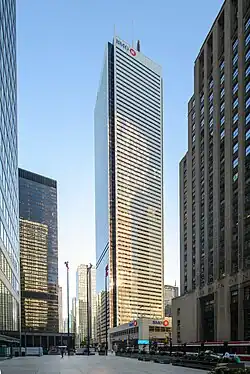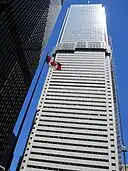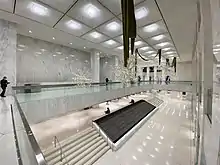| First Canadian Place | |
|---|---|
 | |
 First Canadian Place in 2017 | |
| Former names | First Bank Building |
| Alternative names | FCP |
| General information | |
| Type | Commercial offices |
| Location | 100 King Street West Toronto, Ontario, Canada |
| Coordinates | 43°38′55″N 79°22′54″W / 43.648611°N 79.381667°W |
| Completed | 5 June 1975 |
| Owner | Manulife Financial Corporation (50%), CPP (50%) |
| Management | Brookfield Properties |
| Height | |
| Architectural | 298.1 m (978 ft) |
| Tip | 355 m (1,165 ft) |
| Top floor | 289.9 m (951 ft) |
| Technical details | |
| Floor count | 72 4 below ground |
| Floor area | 250,849 m2 (2,700,120 sq ft) |
| Lifts/elevators | 61 |
| Design and construction | |
| Architect(s) | Bregman + Hamann Architects Edward Durell Stone & Associates |
| Developer | Olympia and York |
| Main contractor | EllisDon Corporation |
| Website | |
| fcpex | |
| References | |
| [1][2][3][4][5] | |
First Canadian Place (originally First Bank Building) is a skyscraper in the Financial District of Toronto, Ontario, at the northwest corner of King and Bay streets, and serves as the global operational executive office of the Bank of Montreal. At 298 m (978 ft), it is the tallest building in Canada, the 31st tallest building in North America, and the 105th tallest in the world.[1] It is also the third tallest free-standing structure in Canada, after the CN Tower (also in Toronto) and the Inco Superstack chimney (projected to be demolished) in Sudbury, Ontario. The building is owned by Manulife Financial Corporation (50 per cent) in addition to a private consortium of investors including CPP Investments. The building is managed by Brookfield Properties.
History and architecture

First Canadian Place is named for Canada's first bank, the Bank of Montreal. Designed by B+H Architects with Edward Durell Stone as a design consultant, First Canadian Place was constructed in 1975 and originally named First Bank Building. The tower and associated buildings occupy a block once home to two major newspapers, the Toronto Star’s Toronto Star Building and The Globe and Mail's William H. Wright Building. The site was the last of the corners at King and Bay to be redeveloped in the 1960s and 1970s, and a major bidding war began over the property. The then-little-known firm of Olympia and York eventually obtained nearly the whole city block, but the election of reformist mayor David Crombie led to new rules banning skyscrapers. It took three years of lobbying before permission for First Canadian Place was granted. When completed, the building was nearly identical in appearance to Stone's Standard Oil Building in Chicago, Illinois;[6] completed two years previous, the Chicago tower is of the same floor plan and clad in the same marble,[7] the only overtly visible difference being the vertical orientation of the windows, as opposed to the horizontal run of those on First Canadian Place.
First Canadian Place was the 6th tallest building in the world to structural top (currently 103rd) and the tallest building overall outside of Chicago and New York when completed in 1975. It was also the tallest building in the Commonwealth of Nations until the completion of the Petronas Towers in Kuala Lumpur, Malaysia, in 1998. The Bank of Montreal "M-bar" logo at the top of the building was the highest sign in the world from 1975 until overtaken by the sign atop CITIC Plaza in 1997. The roof is still the location of a number of antennas used for radio and television broadcasting. The structure contains 29 elevators, and is one of only a few buildings in the world that uses the double-decked variety, and is connected to the underground PATH system.
The building was pictured on the front and rear cover of the 1981 album This Is the Ice Age by Canadian New Wave band Martha and the Muffins and also their 7" single "Women Around the World at Work". The album featured two photos which were taken from the same place but at different times by Muffins guitarist Mark Gane using a time-lapse camera and features the building at midday and dusk. The 7" cover again features the same photo but has 9 small images taken at various times of the day and night.
Cladding


The same white Carrara marble used on Aon Center was employed as an exterior cladding and interior finish for First Canadian Place, with approximately 45,000 marble panels weighing around 200 to 300 lb (91 to 136 kg) each. Foreshadowing what would take place with First Canadian Place in 2007, one of the marble slabs of Aon Center, when it was named the Standard Oil Building, detached in 1974, falling and penetrating the roof of a neighbouring building, resulting in an eventual recladding of the entire Aon Center in white granite between 1992 and 1994. This problem would surface at First Canadian Place as well, during an intense storm on the evening of 15 May 2007, a 1 by 1.2 m (3 ft 3 in by 3 ft 11 in), 140 kg (310 lb) white marble panel fell from the 60th storey of the tower's southern face onto the 3rd-floor mezzanine roof below, causing authorities to close surrounding streets as a precaution.[8][9]
In late 2009, owner Brookfield Properties announced it would follow the example of Aon Center and, over three years, replace the tower's 45,000 marble panels with new ones in glass, those on the main expanses with a white ceramic frit and the corners in a bronze tint.[10][11] Brookfield and the co-owners also launched a multi-faceted rejuvenation program, including "upgrades to the building's mechanical, electrical, and lighting systems that will redefine the standard for enhanced performance, comfort, and greening". FCP's common areas including upper and lower level entrance and elevator lobbies, the retail concourse and Market Place were to also undergo renovation, with new natural stone flooring, fritted glass accents, brushed metal handrails, landscaping, and water features. The rejuvenation program design architects were Moed de Armas & Shannon Architects and Bregman + Hamann Architects were the architects of record.[11] The entire project, completed in 2012,[12] cost was in excess of CA$100 million, paid by the owner. This extensive capital improvement project was intended to provide a new exterior for FCP and eliminate the maintenance costs associated with marble upkeep.
Tenants




Broadcasting
The following Toronto-area broadcasters have their transmitters atop First Canadian Place:[15]
FM stations
- CIND-FM 88.1 (Indie 88)
- CKLN-FM 88.1 (The first radio station to use this transmitter tower. Now defunct.)
- CIRV-FM 88.9
- CIUT-FM 89.5
- CJBC-FM 90.3 (Radio-Canada Espace Musique)
- CKIS-FM 92.5 (Kiss 92.5)
- CFXJ-FM 93.5 (93.5 The Move)
- CJKX-FM-2 95.9 (KX96) +
- CFMZ-FM 96.3 (Classical 96)
- CFZM-1-FM 96.7 (AM740) *
- CKFG-FM 98.7 (G 98.7)
- CBLA-FM 99.1 (CBC Radio One)
- CJSA-FM 101.3 (CMR Diversity FM)
- CFNY-FM 102.1 (102.1 The Edge) #
- CFPT-FM 106.5 (First Peoples Radio)
- CILQ-FM 107.1 (Q107) #
# backup transmitter; main transmitter on CN Tower
+ synchronous transmitter; provides supplementary coverage to primary transmitter in Ajax
* fill-in transmitter; serves downtown core and surrounding inner-city neighbourhoods
Amateur Radio
An amateur Radio digital mobile radio repeater for the Greater Toronto area (VA3XPR) has its antennas mounted just above the broadcast antennas on the radio mast.[16] There are also other analog ham repeaters on the building.
Shopping Mall
According to the First Canadian Place website,[17] the lower floors of the building, as part of the Toronto Path system, feature:
- 120 stores in three floors of Carrara marble
- 6 restaurants
- over 30 eateries
- medical centre, featuring an optometrist`s office and dental clinics
- spas, beauty salons, and a barbershop
- banking and financial planning services from the Bank of Montreal
- dry cleaning and shoe repair
- post office
- FedEx and UPS dropbox
- a parkette on King Street, between the FCP and the Exchange Tower
 Basement Access
Basement Access Basement supermarket and food stall
Basement supermarket and food stall Shopping Mall
Shopping Mall Food Court in Level 2
Food Court in Level 2
See also
References
- 1 2 "First Canadian Place". CTBUH Skyscraper Center.
- ↑ "Emporis building ID 112676". Emporis. Archived from the original on April 7, 2015.
- ↑ First Canadian Place at Glass Steel and Stone (archived)
- ↑ "First Canadian Place". SkyscraperPage.
- ↑ First Canadian Place at Structurae
- ↑ McMillan, Greg (12 June 2007). "Two buildings, two cities, one problem" (PDF). The Globe and Mail. p. B10. Archived from the original (PDF) on 17 July 2011. Retrieved 24 September 2009.
- ↑ "First Canadian Place". The Skyscraper Museum. Retrieved 24 September 2009.
- ↑ Doolittle, Robyn (16 May 2007). "King St. to stay closed". Toronto Star. Retrieved 2014-05-02.
- ↑ "Commuters Dread Second Day Of Gridlock As King St. Stays Closed". CityNews. 16 May 2007. Archived from the original on 18 May 2007. Retrieved 16 May 2007.
- ↑ Yang, Jennifer (2009-09-25). "Bay St. landmark to lose its marble". Toronto Star. Retrieved 25 September 2009.
- 1 2 "Brookfield Properties Announces Recladding of First Canadian Place in Toronto" (Press release). Brookfield Properties. 23 September 2009. Archived from the original on 2013-10-22. Retrieved 2014-05-02.
- ↑ "First Canadian Place – Recladding". B+H. Archived from the original on 11 January 2015. Retrieved 27 January 2015.
- ↑ Offices | Osler, Hoskin & Harcourt LLP
- ↑ Offices | Bennett Jones LLP
- ↑ "Tower Site of the Week: First Canadian Place, Toronto". 12 August 2006. Retrieved 2014-05-02.
- ↑ VA3XPR website
- ↑ "About Us". First Canadian Place. Retrieved 1 July 2013.